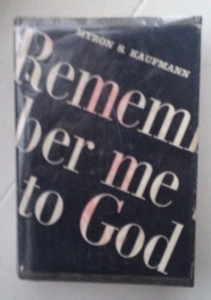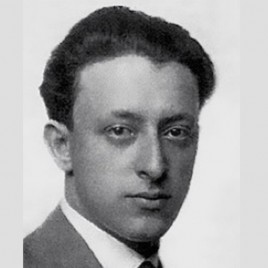Pre-Shabbat Jewish Lit Links

Every Friday My Machberet presents an array of Jewish-interest links, primarily of the literary variety.
Shabbat shalom!

Every Friday My Machberet presents an array of Jewish-interest links, primarily of the literary variety.
Shabbat shalom!

Shabbat shalom–and see you next week!

“Though it was hailed on publication as one of the finest novels ever written about American Jews and remained on The New York Times bestseller list for an entire year,” Josh Lambert has written for Tablet, “almost no one remembers [Myron S. Kaufmann’s Remember Me to God] today. It goes unmentioned in bibliographies of American Jewish fiction, and so obscure is Kaufmann in this Internet age that searching for his name turns up nary a stub on Wikipedia.”
Lambert’s essay explores the possible reasons behind the book’s obscurity. Having recently immersed myself in the novel (you can find a summary here), I can appreciate Lambert’s arguments and hypotheses. I’m in particular agreement with the suggestion that one should accord attention and respect to the characters of Adam Amsterdam and his daughter Dorothy. But I can’t get away from how unpleasant—dare I say, how unsympathetic—I found the ostensible protagonist, Richard Amsterdam (Adam’s son and Dorothy’s brother).
This character is so repellent that he made it challenging for me to stick with the novel—which runs more than 600 pages—despite the book’s unquestionable artistic merits as (again borrowing from Lambert) “a finely wrought triumph of midcentury realism.” Like Lambert, I have personal connections to Harvard, where much of the novel unfolds, and innumerable details within the novel struck chords of not-unpleasant memory. But Richard Amsterdam (and, to a lesser extent, Richard’s mother) so appalled me that I’m not sure how comfortable I’d feel recommending this book to others without some warnings.
Still, I can understand Lambert’s enthusiasm. And I’m not sorry that I read it.
Have you read Remember Me to God? What was your take?

Every Friday My Machberet presents an array of Jewish-interest links, primarily of the literary variety.
Shabbat shalom.

For a long time, I was known to describe Verdi’s as “my favorite Requiem.” The first time I attended a live choral performance, I was overwhelmed by it.
That was many years ago. Since that first performance, I have listened over and over to a CD. But Monday evening I attended another live performance. And I can’t quite find the words to articulate how extraordinary it was.
So I’ll borrow from others.